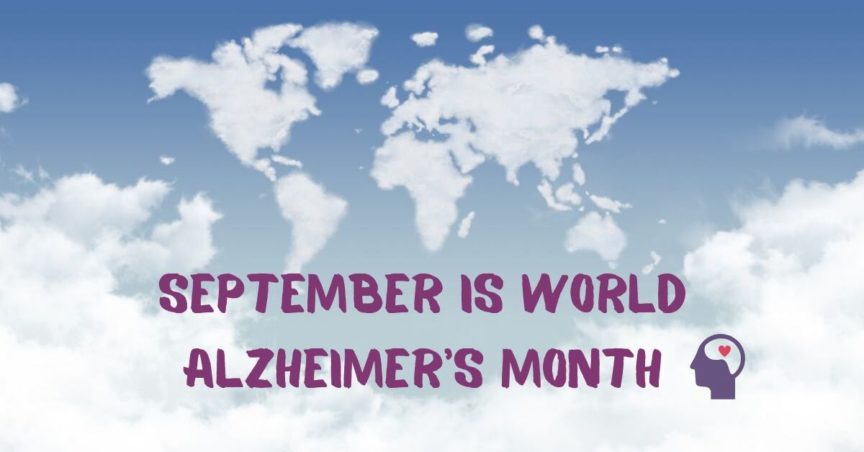- The Harm of Smoking to the Ears - April 9, 2025
- The Importance of Exercise for Hearing Health - March 11, 2025
- Movie Theaters and Hearing Aids - February 13, 2025
September brings the worldwide initiative, World Alzheimer’s Month. This campaign is designed to raise awareness around the world about the disease as well as address the stigma that surrounds it. Alzheimer’s disease is a brain condition that impacts areas which control thought, memory, emotion and language. Dementia is a decline in mental function that cannot be reversed, and Alzheimer’s disease is the most common form of dementia.
Globally, two out of three people believe there is little to no understanding of dementia in their countries yet the impact is widespread. Alzheimer’s disease is projected to impact 152 million people world-wide by 2050.
So why are the audiology professionals at Better Hearing Center so concerned about Alzheimer’s disease? Because more studies than we can count link untreated hearing loss with early on-set dementia. So, if you’ve been putting off a hearing evaluation, avoiding dementia is a great reason to call today! Another good reason is hearing evaluations are free at Better Hearing Center.
Alzheimer’s Disease and Aging
In addition to untreated hearing loss, there are other factors that may put you more at risk for getting Alzheimer’s disease. They include rheumatoid arthritis, hypertension, diabetes, smoking and obesity. Forms of dementia can result from Parkinson’s and even alcohol abuse. But Alzheimer’s disease, by far, is the most common form of dementia. Sixty to 80% of dementia cases are diagnosed as Alzheimer’s.
Early indicators of Alzheimer’s may not seem serious – but they are. They do include memory loss, but also difficulty finding the right words, problems understanding what people are saying, not being able to perform what were previously routine tasks as well as personality and mood changes. You may walk into the super market where you’ve been countless times and not recognize anything or know where you are. You may not know what a dollar bill is and how to pay for something – including paying routine bills you’ve taken care of once a month for years. Friends may remark they’ve answered a question you just asked five minutes ago and you may discover household objects in odd places in your home. Personality changes that occur include paranoia and distrust of family members as well as caregivers.
Untreated Hearing Loss and Cognitive Decline
Hearing loss is a fact of life for 48 million Americans and as you get older, the chances of experiencing hearing loss go up. The majority of people over age 75 have hearing loss. Dr. Frank Lin, an otologist and epidemiologist with Johns Hopkins University, did several studies involving cognitive decline and hearing loss. The studies reinforce the theory treating hearing loss can stave off cognitive decline and dementia.
It is important to get hearing loss evaluated and treated. Many adults wait up to seven years to get hearing loss treated and by that time, they may well be on the way to early on-set dementia.
Alzheimer’s Disease and the Brain
The brain is an organ that requires activity to stay healthy. Staying involved in social activities outside the house, driving, shopping, walking outdoors – these are all great brain exercises because you are interacting with your environment. Baking, doing the crossword puzzle, reading, and even watching television can help keep you sharp.
Working your brain too hard for certain tasks might result in reduced resources for other important functions. Untreated hearing loss could make it difficult for your brain to decode sounds and access only fragments of conversations. It puts what scientists call a “cognitive load” on certain areas of the brain and not others. If you are using too much of your brain for the same thing – other cognitive abilities are reduced. People who have trouble hearing tend to isolate themselves and this cuts out an important piece of social interaction. Isolation leads to depression and depression is one of the that can lead to cognitive decline and dementia.
Better Hearing Center
The good news: treating hearing loss significantly helps your cognitive abilities. A French study used subjects 65 to 85 with profound deafness in one ear. Each received an implant to improve the hearing in that ear and after one year – 86% of the test subjects showed significant improvement in cognitive abilities.
Individuals who get hearing aids report a better quality of life from increased social interaction to better sleep habits! At Better Hearing Center, we believe the ability to hear well is a necessity and we’re ready to help you. Contact us today to learn more!

